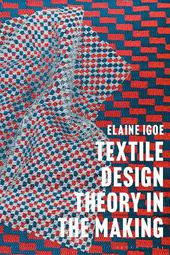
|
Textile Design Theory in the Making
Paperback / softback
Main Details
Description
Textile design inhabits a liminal space spanning art, design and craft. This book explores how textile design bridges the decorative and the functional, and takes us from handcrafting to industrial manufacture. In doing so, it distinguishes textiles as a distinctive design discipline, against the backdrop of today's emerging design issues. With commentaries from a range of international design scholars, the book demonstrates how design theory is now being employed in diverse scenarios to encourage innovation beyond the field of design itself. Positioning textiles within contemporary design research, Textile Design Theory in the Making reveals how the theory and practice of textile design exist in a synergistic, creative relationship. Drawing on qualitative research methods, including auto-ethnography and feminist critique, the book provides a theoretical underpinning for textile designers working in interdisciplinary scenarios, uniting theory and texts from the fields of anthropology, philosophy, literature and material design.
Author Biography
Elaine Igoe is Senior Lecturer in Fashion and Textile Design at the University of Portsmouth, UK.
ReviewsDelving into the interstices of textile design and textile making, Igoe's richly conceived and generously formed text offers a new paradigm for textile design practices ... suggesting an oscillating space that is as rich as it is discursive as it is rigorous. * Catherine Dormor, Royal College of Art, UK * Igoe has partnered her voice with a refreshingly original set of contributors who each move the discourse of textile design beyond generic design vocabulary through unapologetic narration of the personal and particular. * Jessica Hemmings, University of Gothenburg, Sweden * Igoe poetically layers the too-long unspoken words which locate the impulses that have driven generations of textile researchers and makers. The next generation can draw on this brilliant book to confidently amplify their political and personal matrixial voices. * Rebecca Earley, University of the Arts London, UK *
|